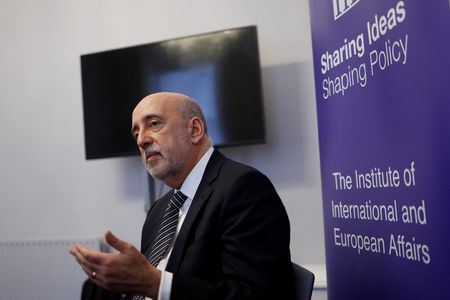By Philip Blenkinsop and Benoit Van Overstraeten
BRUSSELS (Reuters) – European Commission President Ursula von der Leyen described U.S. President Donald Trump’s universal tariffs as a major blow to the world economy and said the European Union was prepared to respond with countermeasures if talks with Washington failed.
Von der Leyen said the EU was already finalising a first package of tariffs on up to 26 billion euros ($28.4 billion) of U.S. goods for mid-April in response to U.S. steel and aluminium tariffs that took effect on March 12.
“And we’re now preparing for further countermeasures to protect our interests and our businesses if negotiations fail,” von der Leyen said in a statement she read out in the Uzbek city of Samarkand on Thursday, ahead of an EU-Central Asia partnership summit.
Trump on Wednesday unveiled a 10% minimum tariff on most goods imported to the United States, with a higher 20% rate for the European Union.
Von der Leyen did not provide details of future EU measures.
A French government spokesperson said further measures on a broader range of goods and services would come into force at the end of April. Nothing is yet decided, she added, but services, notably digital services, are likely to be a focus.
Italian Prime Minister Giorgia Meloni said late on Wednesday the EU would strive for a deal with the United States to avoid a trade war, but did not rule out an “adequate” European response.
The nature of that response is likely to be a topic for EU trade ministers when they meet in Luxembourg on Monday.
In a war of tariffs on goods, Brussels has less to hit than Washington, as U.S. goods imports into the EU totalled 334 billion euros ($365.6 billion) in 2024, against 532 billion euros of EU exports to the United States.
The EU would also be reluctant to target U.S. oil and gas exports, which make up nearly a quarter of its U.S. imports, and the 10% share for pharmaceuticals.
TARGETED RETALIATION?
Ignacio Garcia Bercero, a fellow of think-tank Bruegel and the EU’s former chief negotiator for a planned EU-U.S. trade deal, said the EU needed smarter, more targeted retaliation that maximised the political impact in the United States.
He said the EU might use much broader counter-measures that could limit U.S. companies’ access to EU public procurement tenders or to EU services markets from financials to tech.
The Trump administration’s inclusion of EU taxation and regulation in its “reciprocal tariff” calculations could amount to coercion, Garcia Bercero said.
Washington said the EU’s effective tariff was 39%, with Trump criticising EU value-added tax and public health rules that exclude U.S. poultry from its market. The EU says VAT is not a tariff and is similar to the U.S. sales tax.
The World Trade Organization says the EU’s average tariff rate is 5.0%, while the Commission says the average tariff on goods traded between the EU and the U.S. is about 1% for both sides.
The EU rate for cars at 10% is above the U.S. duty of 2.5%, but the United States imposes 25% duty on imported pick-up trucks, the largest segment of the U.S. auto market.
The European Central Bank has estimated that a blanket U.S. tariff of 25% on European imports would lower euro zone growth by 0.3 percentage points in the first year. EU counter-tariffs on the U.S. would raise this to half a percentage point.
A February report by consultants Frontier Economics estimated a 20% blanket tariff would hit EU goods exports by $209 billion, with a slight pick-up for services exports.
The EU also faces 25% U.S. tariffs on steel and aluminium tariffs, on cars from Thursday and on car parts within a month, with pharmaceuticals possibly to come.
French President Emmanuel Macron on Thursday will host representatives of business sectors that will be hit by the new tariffs, which apply from Saturday.
Von der Leyen said she deeply regretted the U.S. move and warned of “immense consequences” for the global economy.
She said she agreed with Trump that others had taken unfair advantage of global trade rules and was ready to support efforts to reform them.
“It is not too late to address concerns through negotiations,” she said.
($1 = 0.9137 euros)
(Reporting by Benoit Van Overstraeten and Philip Blenkinsop; Editing by Sonali Paul and Gareth Jones)







